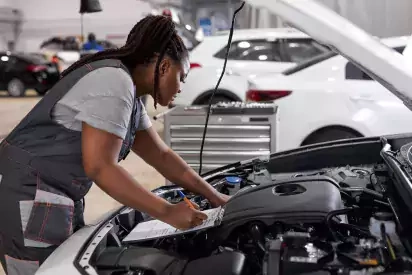Opening the doors

“No matter how far the industry has come, certain expectations and assumptions about gender roles still tend to dominate”
There’s still surprise when motorists encounter a female technician. Of course, it’s swiftly shored up with ‘Good for you’, ‘And why not?’, ‘How did you end up here?’ or my personal favourite, ‘Well, if you want equality, you best start doing some of the harder jobs!’
I’ve spent 15 years in the business, and after that length of time you develop a reasonably thick skin. But even so, comments like these do serve as a reminder that no matter how far the industry has come, certain expectations and assumptions about gender roles still tend to dominate.
Part of the issue, at least for the independent aftermarket, is the route from education to the industry. Rather than serving as an aspiration, a career in automotive is often wrongly perceived as a fall-back option. Comments like ‘Well, we can’t all have degrees!’ gloss over just how complex many roles in this profession really are. It is therefore curious how dismissive motorists can be about the level of skill required, while also assuming that only men can do these jobs. The role of a vehicle technician is thought to be dirty, physical and of a low skill level, and yet it jars with people’s expectations of what women can do or should be doing. Occasionally, people even seem surprised that women would want to do the job at all.
For small businesses, the role of women in a technical position is often entwined with family. After all, it can be difficult to gain entry to the shop floor without some sort of pre-existing relationship. Worries about pregnancy and childcare commitments can sometimes dominate, but concerns about women’s physical capabilities also create barriers to inclusion. Online conversations that appear to show a shared experience of trying to employ female apprentices – and how it didn’t work out – only serve to reinforce unwelcome attitudes about the assumed complexities of a mixed-gender workforce. One can only assume that those businesses taking on exclusively male apprentices only ever had positive experiences and successful outcomes!
But for all the negativity, there are some incredibly valid reasons why an independent workshop should try to improve its diversity.
Quite simply, you’re more likely to feel welcome in a space where you can see others like you. Making the workshop inclusive can make difficult conversations with motorists far easier when they don’t feel excluded. But that isn’t the only reason…
Creativity in thinking: Different people think differently, and that’s a good thing. Having more types of minds on hand to attack a problem will produce more solutions to choose from.
Wider pool of talent: Limiting your hiring choices will simply limit your pool of talent. Why deny your organisation greater choice?
Greater range of skills: A wider range of talent will increase the types of maintenance and repair jobs your workshop can take on.
This is an edited extract from IMI's new MotorPro magazine, received free as part of IMI membership.




